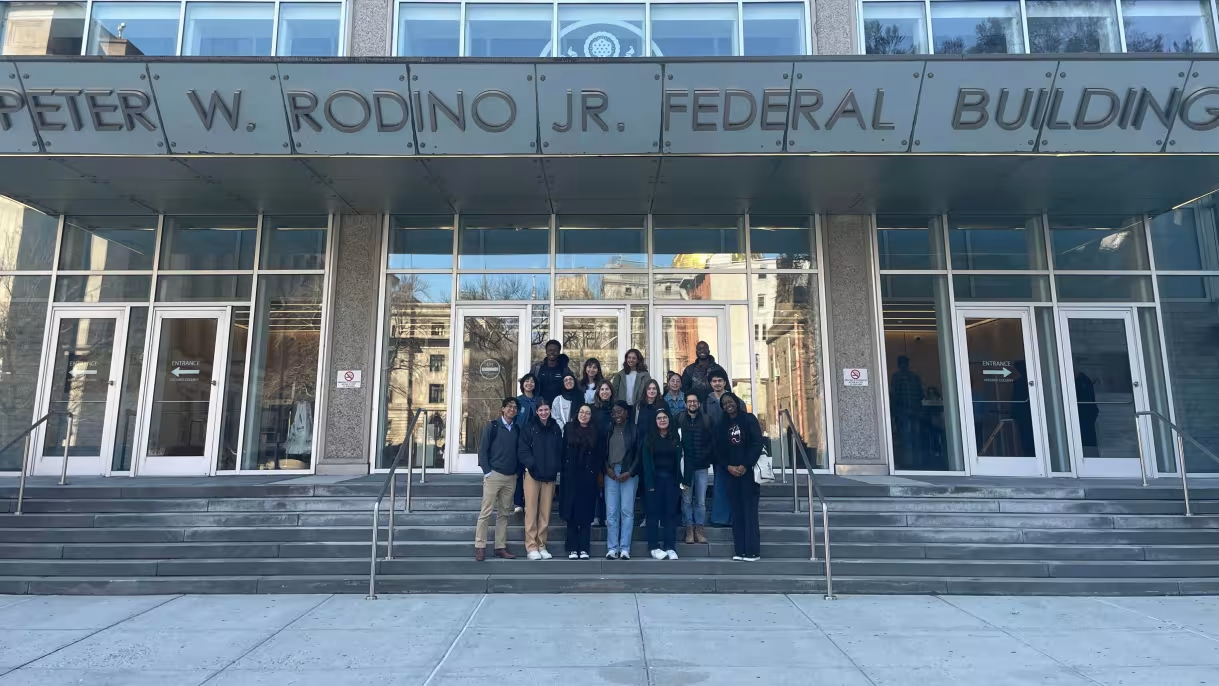

Asylum Lessons Come Alive in Student Court Visit
At dawn on a windy March day, 17 bleary-eyed undergraduates gathered at the campus Wawa to board a bus to Newark. Fueled by cups of coffee and ample pre-reading, the students in Amelia Frank-Vitale’s course “Asylum: Policy, Politics, and Practice” were heading to federal immigration court for an up-close understanding of how the U.S. government handles deportation proceedings.
The experiential courses at the Princeton School of Public and International Affairs are often cited by undergraduate students as a program highlight. From presenting policy recommendations in front of the United Nations to working to help free innocent people who are incarcerated, these courses give students a way to apply what they are learning in real time. Frank-Vitale said the asylum course, which is new this year, aims to teach students about the global asylum system while giving them the chance to engage directly with asylum seekers.
“Taking students to visit immigration court makes the reality of the process concrete and allows students to get a small sense of what the clients we are working with may go through,” said Frank-Vitale, referring to the work students are doing with Project Rousseau, a New York-based provider of immigration services, to help six individuals seeking asylum.
Once they arrived in Newark, the students sat through a deportation hearing for a Mexican woman who has been in the United States without documentation for over 15 years. The students said some of what they witnessed didn’t sit well with them: The judge spoke to the woman through a Spanish translator who selectively relayed what was being said in the courtroom.
The woman’s lawyer also appeared fresh to the case, sometimes unable to locate information requested by the judge. At moments, the students said it seemed as if the judge and the government lawyer – both federal employees – were tag-teaming to poke holes in the defense.
“It’s one thing to read about something. We had done some readings on how immigration court doesn’t work like other courts in the U.S.,” said Angie Rodriguez ’26, a Princeton SPIA junior. “I wasn’t prepared to see the implementation. It was really heartbreaking to see how many things were going wrong.”
Rodriguez, whose parents are naturalized citizens from Ecuador and who is the first in her family to attend college, said she is considering a career in immigration law to help others who are not as lucky in their immigration process.
The students left the courtroom midday to meet with another immigration judge and ask questions about what they had seen. They peppered him with questions about the interpreter, who had selectively translated what was said in the courtroom, and about how the immigration court process is changing under the Trump administration.
Then, the students met with lawyers from the Detention and Deportation Defense Initiative at Seton Hall Law School.
While the judge was more guarded in his responses, Princeton SPIA senior Sibette Vasquez ’25 said she appreciated being able to ask the Seton Hall attorneys more pointed questions about what had happened in the courtroom, given that they work on asylum cases.
“They gave us a primer on how the court is working in this current day,” said Vasquez, who is researching asylum law and interested in nonprofit immigration work. “They were able to give us a more concrete answer of how they see the process changing and what’s to come in the future.”
The court visit also drove home how important documents are in the immigration process. As students prepare “declaration drafts” for the asylum seekers they are helping through Project Rousseau, seeing how heavily the judge in Newark relied on documents to understand the case lit “a fire behind us” to write good drafts, said Loreta Quarmine ’27.
Declaration drafts are a critical document in immigration court proceedings, as they offer a first-person account of why the person fled their country and the dangers they face if they return.
“It made it more real how much our work impacts our clients when they’re submitted to the court,” said Quarmine, who plans to declare a Princeton SPIA major. “Seeing that, down the line, they’ll be in that room and that one of those documents we are producing will be used to help make the decision in the courtroom – it’s pushing us to make sure we do the best we can for our clients.”
Princeton students spent a day at federal immigration court in Newark to learn about asylum and deportation hearings. Photo credit: Amelia Frank-Vitale

